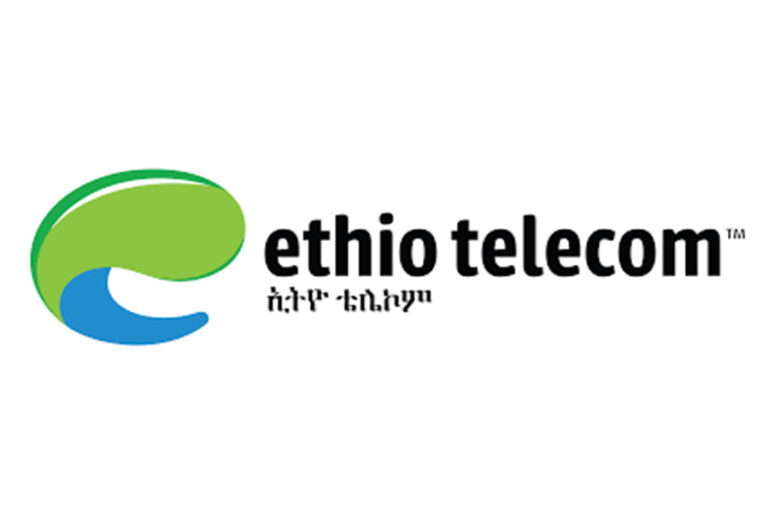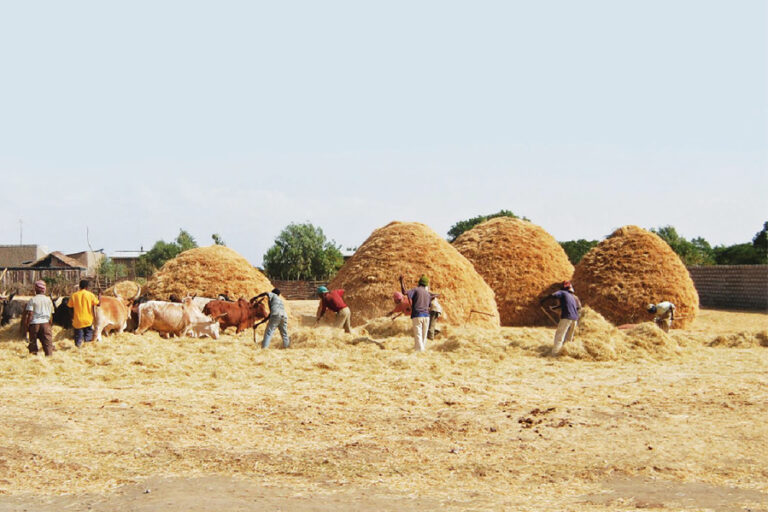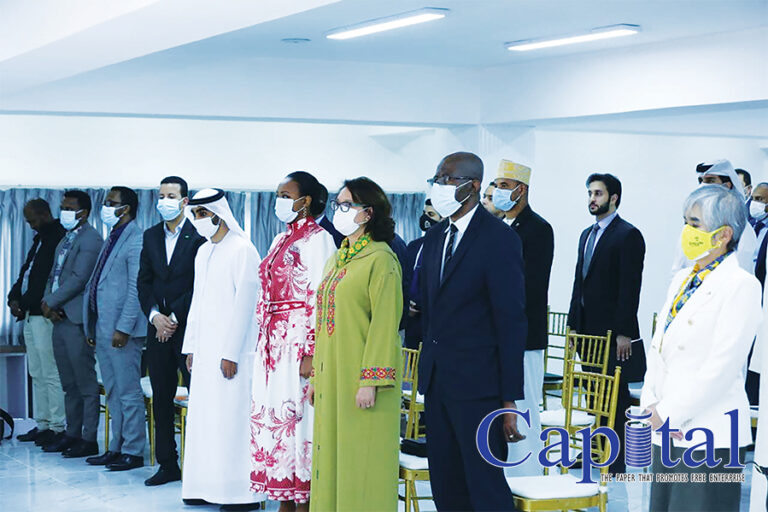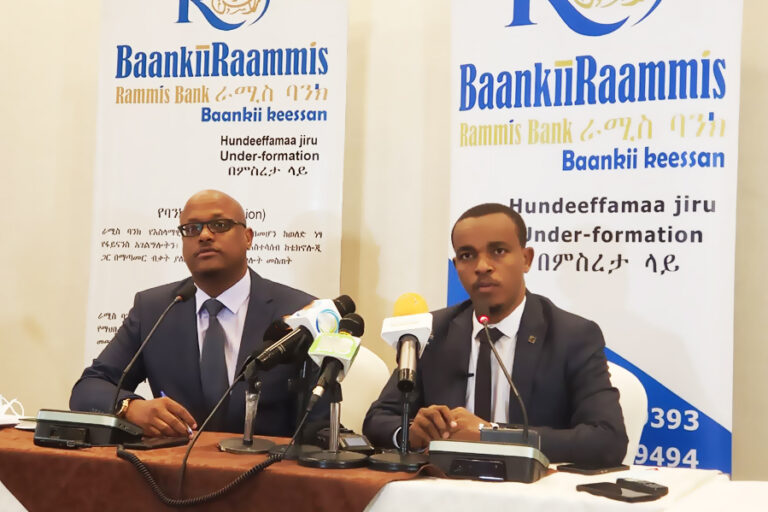Ethio telecom has requested the National Bank of Ethiopia to increase rates of maximum balance that should be available in mobile accounts of customers.
As part of the digital payment strategy and digital inclusion, the government has provided digital payment strategies and mobile money enablers’ cross-border remittance through mobile money or wallet accounts used for both sending and receiving ends of the transfer. However, according to the national bank regulation of mobile and agent banking service directive no FSI /01/2012, the limits of the maximum balance that should be available in a mobile account of a person with a financial institution at any time is not to exceed from 25,000 birr while daily mobile banking transaction that involves debiting of an account by a person with a financial institution is not to exceed from 6,000 birr.
Since the directive is limiting the nation wide mobile money platform Telebirr and its customers from making huge transactions Ethio telecom has submitted its proposal to the central bank, according to sources and the central bank as part of its digital payment strategy is working to improve the directive.
When central bank improves the directive, Telebirr is said to start to enact transactions such as payment of employees’ salaries, business to business transactions and other bulk payments.
Ethio telecom is aggressively working in giving new services as seen by starting international remittance, after receiving a green light from the NBE and the service is expected to start within one month. Ethio telecom is also working to integrate its system with its international partners of which the process is under pipeline of testing.
When it starts giving the service, telebirr will enable customers to receive money from abroad. Both registered and unregistered telebirr users can receive international remittance. Customers can conveniently receive money via their mobile number from those living abroad.
Currently, there are 9.5 million and growing subscribers of telebirr with 1.14 billion birr being transacted through telebirr. So far, 26,442 agents have been providing telebirr services across the country with 8 banks being integrated with the platform.
It is to be recalled that, the Telecommunications CEO said that the new service, telebirr, will mark a shift for Ethiopia, where the banking system is seen as inefficient with 19 commercial banks serving a population of about 115 million. To this end, within the coming five years about 50 percent of the total Ethiopian economy or 3.5 trillion birr in transaction is expected to go through tele birr.
Today, in Ethiopia, more than 90% of all retail transactions are estimated to be conducted in cash. Low and high-value transactions are most often carried out in cash, with few exceptions. Cash Purchase Orders (CPOs) and checks are used as alternatives to pay suppliers in the corporate public and private sectors, as well as high-value goods for consumers. Corporate wages from the public and private sectors, as well as pension plans, can be paid by electronic transfer if within the same bank and it is common for the government, donors, and the private sector to ask their employees to open bank accounts at the employer’s banking institution so that the employer can electronically transfer wages. Mobile money is a relatively new concept in Ethiopia, and it is used mostly to buy airtime, but all this will change when NBE revises its directive as per the proposal of Ethio-telecom as more and more functionality will be added when the limits of financial transactions are increased.
Tele proposes thresholds in mobile money
Maturing Ethiopia’s agriculture through quality
The latest position paper and policy brief of Precise Consult under the title ‘Quality Control Systems and Regulatory Gaps in Ethiopian Agricultural Export Commodities’ recommends the government to give crucial and equal attention for agricultural commodities quality control similar to the one on the way to join international free trades. It said improving quality would give the country more earnings with out significantly increasing productivity.
The two documents that analyzed the country quality control system on agricultural products recalled the country has received notifications, warnings, and bans from several destinations on one or several of its agricultural products based on bad quality.
It stated that to be beneficiary and competent in the international market under trade organizations/agreements like African Continental Free Trade Agreement (AfCFTA) and World Trade Organization (WTO) it has also to give attention of quality supply.
“Ethiopia’s direction to be a member of international trade organizations/agreements (COMESA, AfCFTA and WTO), it is imperative to have a well-functioning quality control system and the regulatory framework to support it,” it said.
The position paper said that currently, Ethiopia receives 76 percent of its export earnings from its agricultural products such as coffee, oilseeds, chat, pulses, cut flowers, fruits, vegetables, dairy, and meat, among others.
The first five commodities cover 28.7 percent, 14.5 percent, 11.4 percent, 10.2 percent and 9.6 percent of the volume exported in 2018/19, respectively. Major export destinations in 2018/2019 were Asia (41.6 percent), Europe (25.4 percent), and Africa (20.8 percent).
It shows that how markets and destinations are strict on quality issues “high value markets, like EU or Scandinavia, have stringent requirements where they have little room for tolerance. For instance, for the EU, the allowed Maximum Residue Limit (MRL) level is 0.01 mg/kg for coffee export.”
It applauded that most Ethiopian agricultural products are known around the world for having a distinct flavor that is not matched anywhere else and for this many buyers wish to buy high volumes of produce be it coffee, sesame, spices, beans and others.
“Buyers from high-value markets like the EU are even willing to pay a premium price for it. However, Ethiopian exporters get stuck when it comes to the quality demand coming from buyers aside from other challenges. While the country has a trade deficit of over USD 12 Billion it is still targeting lower value markets due to their less stringent quality requirements. However, with the existing production volume, targeting lower value markets will not be able to close the trade deficit gap,” it elaborates the reality that Ethiopia faces.
It said that countries that have strong quality control on their products are getting significantly higher price for their export.
“The importing countries and their buyers are not paying low prices because of their incapability, as they are the same buyers that pay a higher value for other origins, but it is due to quality reasons a lower price is given to most Ethiopian products,” Precise Consult, who conduct policy papers in different economic issues says, adding, “therefore, without significantly increasing productivity, earning from export can be enhanced through improving the quality of agricultural export products and aim for higher value markets.”
As a whole, the agriculture sector has quality problems including contamination, poor post-harvest handling, adulteration, differing produce size and color, lack of traceability, lack of standards for certain products, and lack of incomplete market information, among others.
Lack of a comprehensive quality regulatory framework which posed several challenges for businesses and ultimately on the country’s export earnings is one of the reasons attributed for such poor quality of agricultural products.
“Overall, poor production, post-harvest, storage, and logistics is compromising the quality of agricultural products. Lack of well facilitated contract farming system, tracing system as well as quality check at various segments of the trading system including primary markets as well as more precise implementation of set regulations have hampered the performance of the private sector as well as the country’s international competitiveness,” it added.
It said that mostly quality control is undertaken at the final stage at the exporters hand or warehouses like on Ethiopian Commodity Exchange (ECX) but that shall be taken starting from the grassroots level.
“Quality control of agricultural export practice starts when products reach either the ECX warehouse in the case of pulses, oilseeds, and coffee, or the Ethiopian Coffee and Tea Authority lab in the case of coffee, or the exporters’ cleaning and packaging facility in the case of other commodities. The only exception of root -level control is in the case of commercial farms where on farm inspection is done by Ministry of Agriculture (MoA) for later certification before export,” it said.
It remind that over the past decades, the Ethiopian government has designed and amended its food quality and safety regulations to ensure a better quality control system for locally produced and imported goods, of which agricultural products are included. To that end different regulatory bodies and testing enterprises including one privately owned have been engaged on the quality control scheme.
Currently, there is no complete system for food quality and safety control in the country except efforts made by above stated institutions regulating some segments of the value chain.
“The fact that Ethiopia, through Ethiopian Standard Agency with other actors like Ethiopian Food and Drugs Authority, ECX, and MoA, sets (sub) standards that most of the time are not the same as international standards, brings an additional cost to exporters who aim at markets that require adhering to global standards. The country also has only one conformity assessment enterprise which is still not internationally recognized for most tests and one local private-run food laboratory. Both facilities struggle to import chemicals for testing, which makes the testing price extremely high,” it said.
It added that at a national level, the quality control policy and strategic direction need to answer the question of the main point of testing at the exit stage, “As that would only increase the rejected volume of products at the last mile and reduce export volume. Hence, advocating for more consolidation on improving and controlling the quality of agricultural products from production all the way to export is important.”
It alarmed that another potential national threat is the engagement of Ethiopia in trade setups like the AfCFTA and the planned WTO membership without a concise quality control system in place.
“Free trade involves availing more for consumers with better quality and or lower cost. Currently, most Ethiopian products are not the cheapest in African or international context. Moreover, low price is not always the competitive edge for the country’s agricultural products; quality could be the next factor buyers would be looking into.”
It said quality-oriented marketing would be a challenge for the country, thereby losing its market position, “also, the lack of quality-driven competitiveness among local businesses would shock the private sector and results in low economic performance in the short term.”
Besides policy and strategy, the policy brief recommended that to learn from experience of other countries and apply option of vertical integration for all commodities in order to give the private sector the means of trading traced commodities as well as investing in quality measures upstream while the public regulates the market to ensure there is no abuse by any actor.
Setting up quality control mechanism at primary markets with improved quality control infrastructure to enable corrective measures for the poor quality as well as avoiding aggregation of poor and good quality together, and incorporating quality standard awareness in the extension package as well as contract farming/outgrowers’ setups to increase quality orientation in production are other recommendations mentioned on Precise’s policy brief.
“Developing and implementing a strategy to adjust to international quality standards, while promoting market oriented policy may give higher volume export it does not automatically mean higher quality. Disease and chemical testing need to be conducted at national level for export commodities to maintain good national image,” the position paper added.
Morocco, EIC lay investment networks
The Ethiopian Investment Commission jointly with the Embassy of the Kingdom of Morocco to Ethiopia organized the first Investment Networking Platform held on Friday 24th September 2021 at the Ethiopian Investment Commission.
The event was organized to encourage better communication, knowledge sharing and networking among government stakeholders, Ambassadors and Commercial attaches of different Embassies, Investors & Investment Associations/Chambers/Forums. Different stakeholders including Lelise Neme, Commissioner of the EIC, Nezha Alaoui, ambassador to the Kingdom of Morocco to Ethiopia had attended the event.

“EIC is planning to hold such kinds of networking events throughout the year, as a platform where, different stakeholders, investors, diplomatic society government officials to meet and discuss on the investment sector,” said Lelise Neme, commissioner of the EIC,
The first serious of networking event that aims to create an intimate circle between the investment community and the concerned government & stakeholders bodies was also held on the day at the commission’s compound. The event will be held every 15 days in collaboration with various countries embassies and expected to help in regards of promoting investment to the international community.
Ramis bank draws closer to joining IFBs
The under formation Ramis Bank announces that it has successfully accomplished the resource collection to meet the deadline of National Bank of Ethiopia (NBE), which gave six months for the under formation banks to file its request for the license with the capital of half a billion birr.
In April, NBE had revised the minimum paid up capital of the banking industry from 500 million birr to five billion birr. But, under ‘minimum capital requirement for banks: directive no. SBB/78/2021’ it has called banks that are on their formation process to finalize their process with 500 million birr paid capital and request for license until October 12.
As per its process, Ramis which got the name from one of the biggest tributary of Wabi Shebele River and the largest river in eastern Ethiopia said that it has successfully secured 724 million birr paid up capital to realize its operation.
Abduljewad Mohamed, Lead Promoter of Ramis Bank, said that the amount floated for share sales in general was two billion birr of which so far 724 million birr has already paid.
The amount that the under formation bank collected is higher by 50 percent than compared with the requirement of NBE.
Based on the process, Ramis is expected to undertake the founding general assembly prior to filing its application for license.
“We have got the go ahead from the regulatory body, NBE, to conduct the founding general assembly and we have already called shareholders for the meeting that is scheduled to be held on October 2,” Ibsa Boru, who is supporting the organizers of the bank on the back to become operational.
According to Abduljewad as an interest free bank (IFB), Ramis would focus on investment banking concepts, “one of that is we would give priority for agricultural investment similar to other services.”
As per the latest information, about six thousand shareholders have been involved on the bank that is expects additional instrument on the IFB that is recently permitted and until now two are operational.
“Under the share selling, COVID 19 has been a serious obstacle with other minor challenges, while we have achieved our target,” Abduljewad said.
Ramis that officially started its formation process in September 2019 is now on the final stage, “as per the plan the bank will be operational swiftly since it got a green light from NBE.”
Currently, Zamzam and Hijra are fully IFB banks and have commenced operation in the past fiscal year. However there are conventional and IFB financial firms that are on the process to join on the business, while the deadline for NBE requirement is nearing.
Recently, NBE announced that it will not give any extension for the under formation banks to come up with the required capital until the second week of October.
Yinager Dessie, Governor of NBE, said that there are some under formation banks that are tirelessly working to come up with the requirement and some others are in difficulty to amass to the amount, “we will never give extensions due to that they have to come as per the period.”






